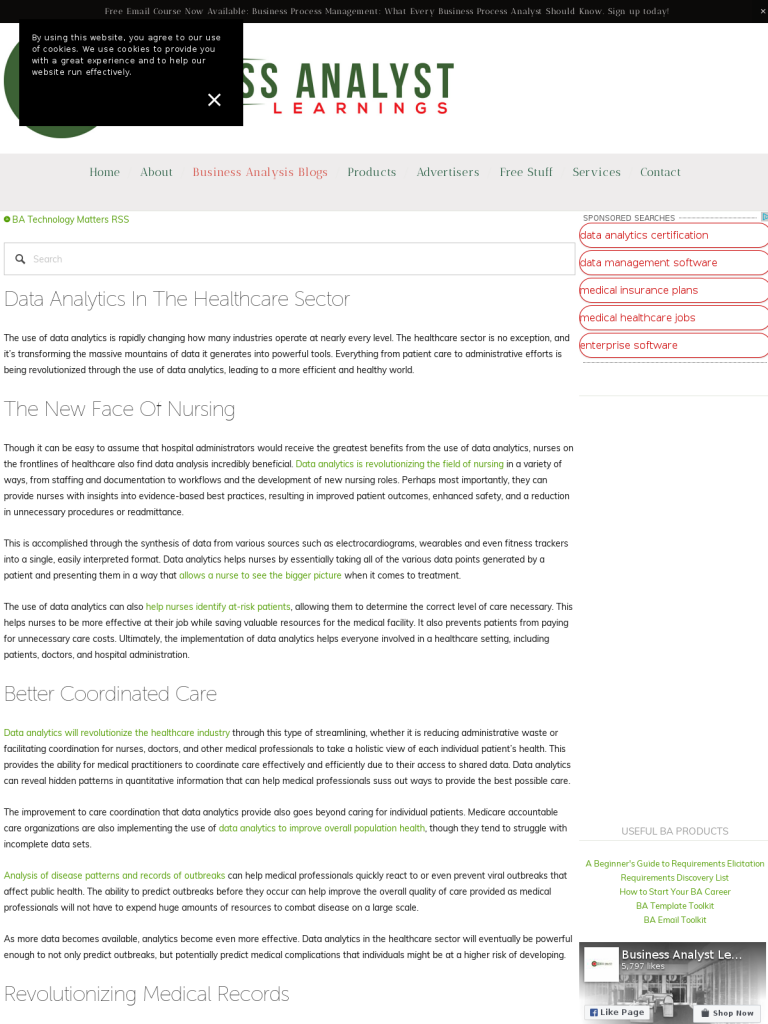Data Analytics In The Healthcare Sector
Blog: Business Analyst Learnings Blog
The use of data analytics is rapidly changing how many industries operate at nearly every level. The healthcare sector is no exception, and it’s transforming the massive mountains of data it generates into powerful tools. Everything from patient care to administrative efforts is being revolutionized through the use of data analytics, leading to a more efficient and healthy world.
The New Face Of Nursing
Though it can be easy to assume that hospital administrators would receive the greatest benefits from the use of data analytics, nurses on the frontlines of healthcare also find data analysis incredibly beneficial. Data analytics is revolutionizing the field of nursing in a variety of ways, from staffing and documentation to workflows and the development of new nursing roles. Perhaps most importantly, they can provide nurses with insights into evidence-based best practices, resulting in improved patient outcomes, enhanced safety, and a reduction in unnecessary procedures or readmittance.
This is accomplished through the synthesis of data from various sources such as electrocardiograms, wearables and even fitness trackers into a single, easily interpreted format. Data analytics helps nurses by essentially taking all of the various data points generated by a patient and presenting them in a way that allows a nurse to see the bigger picture when it comes to treatment.
The use of data analytics can also help nurses identify at-risk patients, allowing them to determine the correct level of care necessary. This helps nurses to be more effective at their job while saving valuable resources for the medical facility. It also prevents patients from paying for unnecessary care costs. Ultimately, the implementation of data analytics helps everyone involved in a healthcare setting, including patients, doctors, and hospital administration.
Better Coordinated Care
Data analytics will revolutionize the healthcare industry through this type of streamlining, whether it is reducing administrative waste or facilitating coordination for nurses, doctors, and other medical professionals to take a holistic view of each individual patient’s health. This provides the ability for medical practitioners to coordinate care effectively and efficiently due to their access to shared data. Data analytics can reveal hidden patterns in quantitative information that can help medical professionals suss out ways to provide the best possible care.
The improvement to care coordination that data analytics provide also goes beyond caring for individual patients. Medicare accountable care organizations are also implementing the use of data analytics to improve overall population health, though they tend to struggle with incomplete data sets.
Analysis of disease patterns and records of outbreaks can help medical professionals quickly react to or even prevent viral outbreaks that affect public health. The ability to predict outbreaks before they occur can help improve the overall quality of care provided as medical professionals will not have to expend huge amounts of resources to combat disease on a large scale.
As more data becomes available, analytics become even more effective. Data analytics in the healthcare sector will eventually be powerful enough to not only predict outbreaks, but potentially predict medical complications that individuals might be at a higher risk of developing.
Revolutionizing Medical Records
One of the most practical ways that data analytics are changing the healthcare sector is through the transformation of medical records. Instead of using the archaic physical medical records that medical professionals have used for decades, modern practitioners of medicine have the luxury of electronic health records (EHRs).
These have significantly improved the quality of care that patients receive as they replace the need for medical professionals to manually update and store physical records. EHRs also provide near-instant access to important patient information that can very well be the difference between life and death in an emergency.
An optimized EHR system is vital to the ability for any medical facility to function at its highest capabilities. EHR systems improve a medical professional’s ability to do their job while simultaneously cutting down on the time patients have to wait before receiving treatment. Allergy information, family medical history, immunization records and other important patient data is collected and stored in an easily accessible and optimized system.
It isn’t just patients and physicians who benefit from data analytics in this fashion. Health and medical administrators are able to look at trends in patient activity, record keeping, and financial planning with greater clarity thanks to the power of data analytics. Data analytics help administrators make their facilities capable of both providing the best possible care for patients and turning a profit as well. After all, healthcare is still a business, and the bottom line matters even when people’s health is involved.
Nurses, patients, physicians and medical administrators all benefit wildly from the implementation of data analytics in the healthcare sector. Patients receive better care while nurses and doctors are provided with invaluable insights from data pools. Administrators don’t have to deal with the headache that comes from traditional medical record storage with the added benefit of finding ways to improve the facilities which they may not have seen without data analytics.
Leave a Comment
You must be logged in to post a comment.








